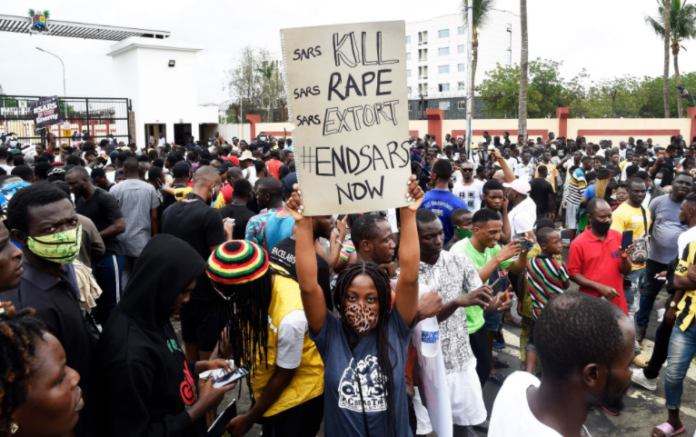By Jonah Ruddock
Source: Pius Utomi Ekpei/ AFP- Getty Images
The death of George Floyd last May inspired nationwide protests and highlighted systemic racism and police brutality that have plagued the United States for decades. Police brutality, unfortunately, is not a problem unique to our country. In Nigeria, people have taken to the streets to protest the Special Anti-Robbery Squad (SARS), a part of the Nigerian police force infamous for murder, armed robbery, kidnapping, and torture. This violence isn’t rooted in racism, as most of the country is black, but in opposition to the residual colonialist ideas that focus on protecting the rich and powerful. In the words of civil rights activist Segun Awosanya, policing across the African continent is designed to “protect the rulership and not the ruled.” Poorly trained and underfunded police officers find themselves in a system that makes it dangerously easy for them to abuse their power. In the first two weeks of the coronavirus lockdown, a report by the National Human Rights Commission found that more people died from police violence than from COVID-19. Amnesty International writes, “SARS officers have turned their duty to protect Nigerians into an opportunity for extortion and stealing money, property and other valuables belonging to suspects and their families.”
Demographically, Nigeria is a young country, with 62% of the population under 24 years old. The median age is roughly 18. Young people have been a powerful force of social change, supplementing protests with a globally-trending social media campaign to #EndSARSNow. Tired of empty promises that SARS would be reformed, they demanded that the unit be dissolved altogether. Growing resentment toward the unit was brought to a head when a video of their members shooting a man to death in Delta state was released. Since then, other videos and stories have been shared online of atrocities committed by SARS. Protests have broken out all over the country. At sit-ins and marches, peaceful protesters were sometimes beaten or dispelled by teargas and bullets. The situation is reminiscent of the government’s response to the #RevolutionNow protests in August.
President Muhammadu Buhari and his administration increasingly infringe upon the right to freedom of expression, and some believe Nigeria’s democracy is starting to look more like a police state. A country that once penned a constitution proclaiming that “the press, radio, television and other agencies of the mass media shall at all times be free to uphold…. the responsibility and accountability of the Government to the people” is now governed by those unable to handle criticism. They are silencing opposition voices with violence.
On October 11, SARS was officially disbanded. President Buhari promised to deliver justice to victims of police abuse and to investigate the death of Jimoh Isiaka, a protester killed in Oyo state. The governor of Lagos, Babajide Sanwo-Olu, also made promises about “speedily” reforming the police force. However, SARS officers are not being disciplined or let go. They’re simply being redeployed to other units, and a replacement unit to perform the same function as SARS is being organized. Many are frustrated by this outcome and believe it won’t bring about tangible change, adding to a long list of unmet promises from the Nigerian government (after similar protests in 2018, the country’s police chief reorganized the Special Anti-Robbery Squad, but it made little progress).
To many Nigerians, dissolving SARS is only the beginning. In the words of musician Ikechukwu Onanuku in an interview with the Guardian, “We won’t stop, we’ll be here tomorrow and the next day and next year until there’s change. People are fed up, not just here but globally”. Onanuku was nearly killed in an encounter with the SARS unit.
Through protests and social media, Nigerians might be able to make a great change in the country’s police force. Regardless of the outcome, it’s clear that they won’t be letting up any time soon.

